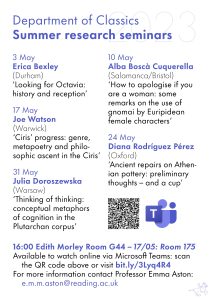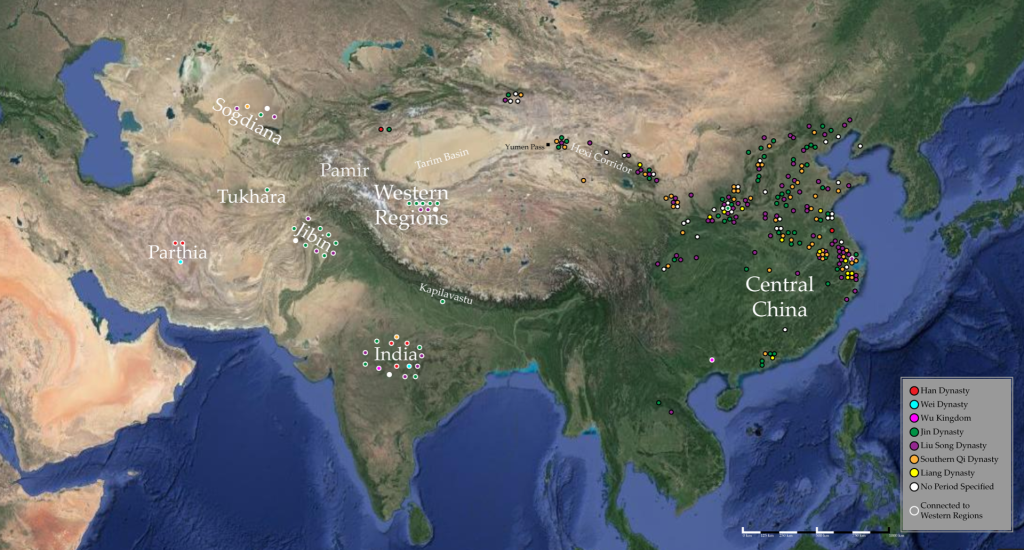 Professor Eleanor Dickey’s new book on Latin words in ancient Greek is being published by Cambridge University Press on June 15th. Colleagues interviewed her about this momentous (for her, at least) event and learned some surprising facts.
Professor Eleanor Dickey’s new book on Latin words in ancient Greek is being published by Cambridge University Press on June 15th. Colleagues interviewed her about this momentous (for her, at least) event and learned some surprising facts.
Q: How long is your book?
A: Over 700 pages.
Q: Goodness, why did you do a silly thing like that? You could have split it in thirds and gotten credit for three books!
A: You’re right, I admit it – but a dictionary isn’t easy to split up. Plus it’s not only a dictionary, but also a study of which words were borrowed and when and where and why. So when I thought about dividing it into multiple volumes, I had hideous visions of readers ending up with just one of those volumes and having the research questions but not the answers, or the answers without the questions. Or either without the references. When I was writing this book I spent a lot of time with a study of Latin loanwords published over a century ago by someone who split his work into two parts. He put the list of references in the first part, which has totally disappeared; as far as I can tell no scholar in my lifetime has ever found it. So no-one can understand what the abbreviations in the second part mean, and no-one can trace the sources. Therefore the second part is still cited, rather grudgingly, by people who would much prefer to cite its sources. I realise that this is one way to improve your citation index, but still I wouldn’t want anyone to feel about me the way people feel about that man. So I squeezed this book all into one massive volume to make sure that anyone who got hold of it would get the whole thing.
Q: Ah, I see. Your book is a service to scholarship, and that’s why it’s so big that no-one can afford to buy it – how much is it selling for, anyway?
A: I would prefer not to answer that question, if you don’t mind.
Q: Sorry. Maybe tell us some fun facts from your book?
A: The modern Greek word for ‘lettuce’ comes from the Latin word for ‘bitter’. Very appropriate, I think.
Q: Where does modern Greek come into it? I thought this was a book about ancient Greek?
A: It is about ancient Greek, but for each word borrowed, I look at how long that word survived, and about a quarter of the ancient Latin loanwords survive all the way into modern Greek. The modern Greek words for ‘sausage’ and ‘belt’ and ‘bird’ and ‘yellow’ are also from Latin.
Q: Good heavens, why were they borrowing words like that? Didn’t the Classical Greeks have words for those things?
A: Yes, they did, but those words got replaced by Latin borrowings, because during the Roman empire Greek speakers thought Latin was really cool as a way to express some kinds of ideas. Not everything, just certain things. Like today, for many English speakers, French has cachet for naming items of food and clothing, but not for football terminology. For the Greeks, Latin also had cachet for food and clothing, but not for boating or farming terminology. Most cultures seem to feel that foreign words are cool for food and clothing, in fact.
Q: Yes, like coq au vin and haute couture. What other topics caused the Greeks to reach for Latin words?
A: They loved borrowing words for titles of officials in the imperial bureaucracy; you just couldn’t be properly bureaucratic without a Latin title. This was a bit of a problem in late antiquity, when the Latin-speaking half of the empire basically disappeared and the Greek speakers who needed Latin titles were cut off from the Latin speakers who would normally produce them.
Q: But couldn’t they just go on using their old Latin titles?
A: Not always, because you know what bureaucratic types are like. They love reorganising things, and they want everyone to see that they’ve reorganised things, so they need to find new titles to make people notice.
Q: I see. So what did they do?
A: They made up their own Latin titles by putting together Latin words. For example, the Romans had a set of titles starting with a meaning ‘from’, like a secretis ‘from secrets’, that is, the person in charge of secrets. So the Greeks made the title a brevis ‘from letters’.
Q: How do you know they didn’t take that from the Romans? Even if we don’t have it in Latin, surely that could just be an accident of survival?
A: Brevis belongs to the third declension, and a takes the ablative, so a Roman could never say a brevis; it would have to be a brevibus.
Q: Oh yes, of course. I knew that. Er, what’s your favourite Latin loanword?
A: Aditeusantes, aorist participle of aditeuo, which means ‘having entered into an inheritance’.
Q: That looks awfully Greek; are you sure that’s a Latin loanword? What Latin word do you think it comes from?
A: It comes from adeo ‘enter’, but you’d never know that to look at it. The Greeks knew, though, because they wrote aditeusantes in Latin letters.
Q: Wow. Where can we find out more?
A: Try Cambridge University Press’s page for the book, or their blog post, which is a bit more serious than this one.














